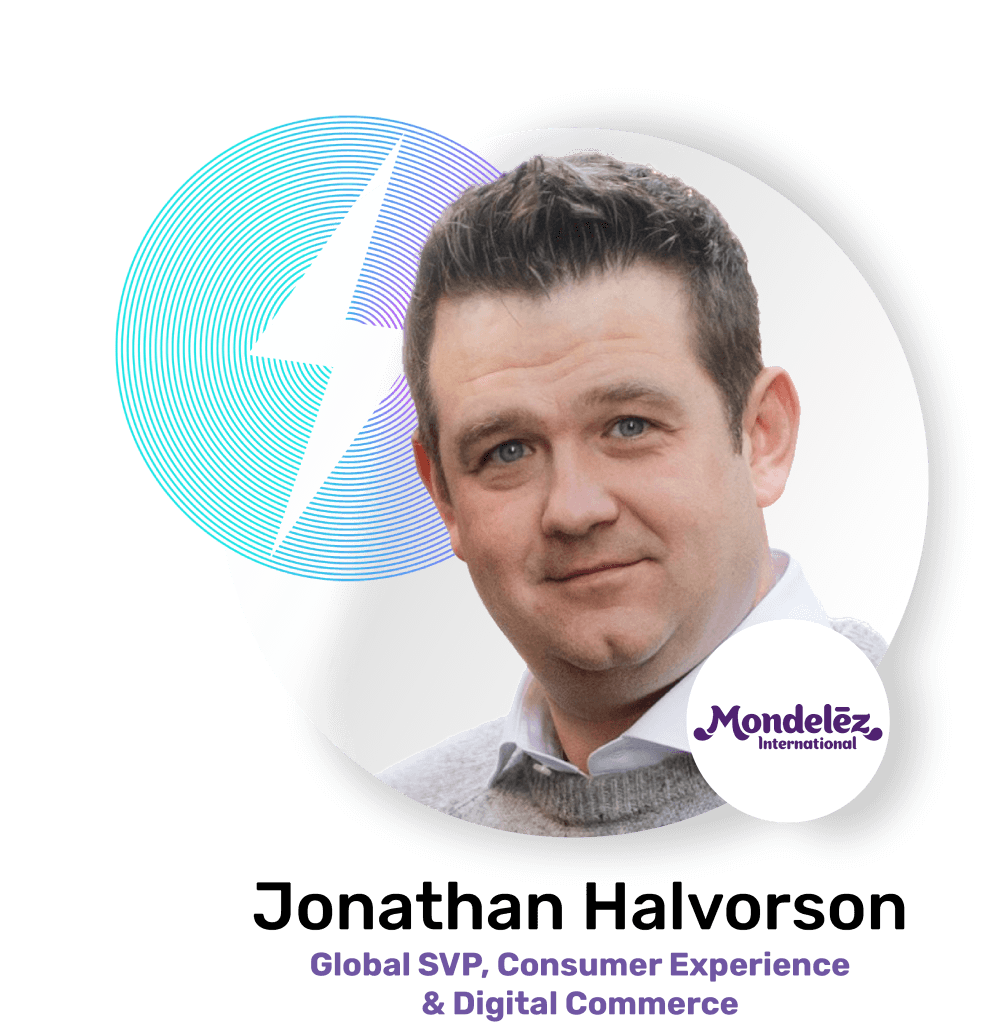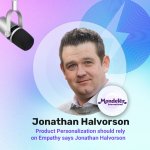In most of our episodes, we talk about what the NOW gen consumer wants, and many of our guests have shared their strategies to remain relevant for this generation. One of these strategies is personalization. For today’s episode, we have Jonathan Halvorson, the Global SVP of consumer Experience & Digital Commerce at Mondelēz, who shares the importance of personalized communication with your consumer and how innovation looks different for every brand. Tune in to hear more about his experience in the CPG industry and his take on what makes brands stay relevant for the NOW gen consumer.

Guest
Jonathan Halvorson
KEY POINTS:
- Brand personalization.
- Empathy in your personalization strategy.
- Innovation: What matters to you in the time horizon?
- Learn what works for your brand.
RELEVANT QUOTES:
“I think everyone expects a high level of personalization and that the mass marketing model was the core cornerstone of how we used to market.”
“And ultimately what consumers are expecting is personalized comms. And so we try and meet that need through data targeting, through ultimately more data-driven media buying, using things like dynamic creative optimization to personalize assets, the individual user.”
“And the key thing being is how do you make sure that you’re matching not to who that person is from a demographic standpoint, but really from what their empathy patterns are and who they really are as a person.”
“The first part of that experience is, is it seamless? Is it just literally what you expect when you have that? I mean, we work in very impulse driven categories. Literally the moment we have from moment of awareness to purchase is just that fast.”
“I think that there’s a richness to our brands. I mean people, we have true taste of a nation brands, whether it’s Oreo, Lou Cadbury, and people want to have a broader experience around that.”
“When we’re doing marketing at our best, we truly delight people, and you get that joy from it.”
“And it’s so important when you see our marketing, you should see the future of where you think marketing’s going. And I think broadly, the teams around the world have done a great job at driving that.”
“We believe in a local-first but not local-only operating model.”
“And so we won’t produce one master television ad and ship that out to all markets. That era of marketing is long gone and will never come back. But rather it’s how do we bring that to life in the US, in China, in Middle East, in Europe, in France, and it’s not even so much Europe as a tapestry. You’ll have different markets will have a different message.”
“Like many organizations, we built e-commerce as a capability and are working to integrate that as the capability matures, it’s between six and 7% of our sales. We have an ambition for it to be significantly more. And ultimately as that becomes a core part of our sales, it’s important to be more and more integrated because the consumer is not going to accept experiences that are incomplete.”
“They don’t judge me based on the experiences they have with Nutella or with M&Ms or Reese’s. They judge me based on the standards of the experience they have on Spotify. The best digital experience you have no matter what the category is, becomes the standard bearer for everyone else. And that’s what we have to live up to.”
“What you need to do is get to the big idea and then say to yourself, how can we unlock value by personalizing that idea? And that’s the question. And we say to ourselves, we personalize not to scale the number of ads, but to scale our empathy.”
“And where that ultimately gets us to is an idea of any time you see a big idea that we’re putting on in front of the brand, the question that we want every Mondelez market to ask is how would this idea be better if we could or more empathetic if we personalized it to people?”
“And when you get that right, it’s unbelievably powerful and you feel so seen, not because the person, the ad looks like you, but because there’s a shared common experience.”
“There is so much data in this world between platforms, advertiser data, you can deliver the message. There will be a company out there who can help you deliver a message to an audience if you can design a message for it.”
“It’s the whole experience. We have a really good one. I love that example. And I totally agree with envy over what my friends at Mars have done, I would say in the business they built, which is just great.”
“We have some exciting work coming out of India where what we have done is we have a very powerful insight, which is everyone in the world has a birthday and there’s one song for everyone and that doesn’t seem to make sense. And so the team in India have partnered to create a gen AI tool where you upload information about your friend and it will create a custom birthday song for you.”
“You just feel really seen. It’s the total experience. So when you give this really nice box of chocolates for birthdays, which is a big occasion that we’re not capitalizing on enough, and now you get a personalized birthday song, you’re taking that whole experience all the way through.”
“And it can be personalization of the product, it can be personalization of the packaging, it can be personalization of some experience that goes with it. And all of it’s super important to what the consumer expects.”
“I think the last decade you won on speed, I think the next decade you win on empathy. You don’t get to avoid speed and speed’s important, but I think that ultimately everyone’s gotten pretty fast.”
“Ultimately, yes, think about speed a lot, but I think the next thing I think about is humanity because I think we’re so overrun with data.”
“As data becomes bigger, humanity is at a huge premium and it will be what differentiates you. So speed’s important, but the new thing, if you are really going to win over the next decade, it’s back to humanity and empathy.”
“I think technology gives you a view of the person, but I think I talk a lot about how did you win the last decade, the last decade you won on data, the next decade you win on identity.”
“Think about how we used to collect insights decades ago, you’d fill out surveys, you’d have people walk around and do this you journals for television viewing. I mean, I think that the technology behind insights and analytics has moved significantly.”
“And yes, technology helps get all the information, but there is still that moment where it has got to be translated into these human truths, and there’s just not enough of those people. When you find one, hold onto them.”
“I think how brands become empathetic is by just being really close to the consumer.”
“Certain brands, just when they talk to their consumers, they feel seen. It’s just a different level. It’s the wink and the smile in their work where you just feel really gotten. I think the Oreo brand does this super well.”
“Good brands have a purpose, and they’re empathetic because they understand the human tension. What are they playing against? And that human tension is what gives them real meaning in this world.”
“So you have product innovation, designing what the future chocolate looks like, and biscuits. And there is a world-class team at Mondelez who obsesses over this and, thank God.”
“Innovation inside the world of marketing. And I think the key thing to innovation in marketing is to understand a few things. One is what matters to you in your category might be super important to you but unbelievably irrelevant to people in other categories.”
“So the important thing is to know which things matter to you. Just because it’s important to Mondelez or p and g or Unilever doesn’t mean it’s relevant to your business.”
“The second question is the time horizon. So, in other words, important now, important next three years, three years plus because it will tell you how fast because you always have to build capability ahead of it being there.”
“You must answer another very important question: what will you suck at? And not enough people focus on what they will be terrible at.”
“So if I choose to be really focused on Gen AI, then I cannot be equally great at these other things. And you have to be really intentional about it and make sure there’s synergies across.”
“So, innovation plays a big role. You have to constantly be looking and building for the future, or you will be left behind, but you got to balance that.”
“I spend a lot of time talking to my team about what we will be bad at and what we will not do because that’s where you’ll save time and capacity. “
“But I just find the closer you get to it, and then along the way, you’ll make mistakes, you’ll make pivots. I shared mine, but just be that close to the consumer and willing to focus, serve them, and adjust as needed. And when you fail, call it a failure, learn, and move on.”

